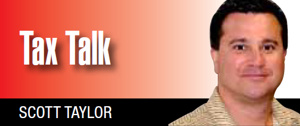As an accountant, I deal with a lot of numbers all day long. But a few figures stand out.
Twenty years ago, 36% of our owner-operator clients were incorporated while 64% were sole proprietors. Today, those percentages have flipped. Roughly 72% are incorporated and 28% are sole proprietors.
Incorporating is a big step, and for most people, it will pay for itself in the long run. A corporation separates your personal life from the business, which helps shield you from liability if things go wrong. It also gives you more flexibility in your tax planning and dealings with CRA.
I ultimately don’t care whether you incorporate or not. I just want you to be a happy and successful client. But any discussion of the pros and cons of incorporation has to include meal deductions. Because once CRA decided that sole proprietor owner-operators had to use actual receipts to support their meal expenses, we saw a rush of clients wanting to change their business structure.
Simplified method
|
Incorporating is a big step, and for most people, it will pay for itself in the long run.
|
An incorporated owner-operator who is an employee of his own company and travels far enough and long enough away from home can use the simplified method (logbooks and TL2 form) to claim meal expenses.
This eliminates the hassle of keeping receipts for each individual meal away from home and can substantially save on taxes, making incorporation worth the effort.
Here’s how it works.
If you’re away from home for five days a week and work 50 weeks a year, your maximum meal claim would be $10,200 (50 weeks times $51 times 80%). As a sole proprietor, do you really think the total dollar value of meal receipts you collect in a year will reach this limit? There’s no way it’s even close. You could be on the hook for $2,500 to $3,500 more in tax compared to what you’d pay by incorporating and claiming meals using the simplified method.
Some sole proprietors continue to use the simplified method to claim meals anyway and hope to not get caught by CRA. A meal claim of this size getting denied will surely lead to big reassessments.
Other benefits
Incorporated owner-operators who are employees of their company can take advantage of other travel-expense benefits. For instance, a per diem or travel allowance paid to you by your corporation is a tax-free benefit, which means you don’t report it as income on your personal return.
Let’s say your company policy on meal and travel expense reimbursement for employees is $80 per day. Taking a per diem could put as much as $400 a week—$20,000 a year—into your pocket tax-free.
At the same time, you could lower your taxable income from salary or dividends and make up the difference with the non-taxable travel and meal allowance. Your corporation would also save payroll-related expenses (CPP and WSIB) because it would pay you less taxable income even though the net amount you take home – salary plus per diem – would be the same.
Audit-proof strategies
Like any other tax-saving strategy, you need to make sure your actions will stand up in case of audit.
For example, the per diem amount must be reasonable. Is $80 reasonable? That’s for you to judge, but our own federal government uses $108 per day to compensate civil service employees for travel expenses.
Does your corporation have policies and procedures for travel allowances and expenses? For instance, as an employee, you could be required to submit travel expense forms before you get your travel allowance.
As you look ahead to 2020, there’s still time in 2019 to talk to your accountant about incorporation. It’s a little more complicated than being a sole proprietor, but the ability to reduce your taxable income and streamline the deduction of an important daily expense could save you thousands of dollars in tax each year.
Scott Taylor is vice-president of TFS Group, providing accounting, bookkeeping, tax return preparation, and other business services for owner/operators.
Learn more at www.tfsgroup.com or call 800-461-5970.
